China Week: Earthquakes and Katy Perry
- Published
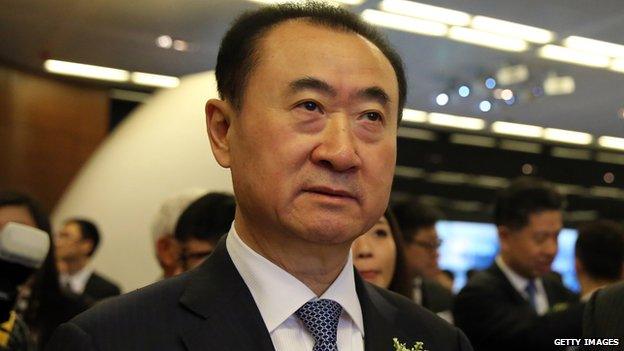
Wang Jianlin is a Chinese businessman and philanthropist, serving as chairman of the Dalian Wanda Group
"Stay close to the government and distant from politics."
The cryptic words of Asia's richest man, the developer Wang Jianlin.
The most important story of the week is one you won't find on any Chinese website or TV bulletin.
In fact, even the names have been censored on social media to discourage searches for the New York Times report, external which unpicks the relationship between China's political and business elite.
After a painstaking three-year investigation of corporate records, reporter Mike Forsythe reveals the money trail between Wanda's Wang Jianlin and the family members of some of China's top politicians.
The developer got bank loans and prime real estate to build his plazas, the lucky investors got shares just as those shares were to rocket in value.
No wonder the report has been censored.
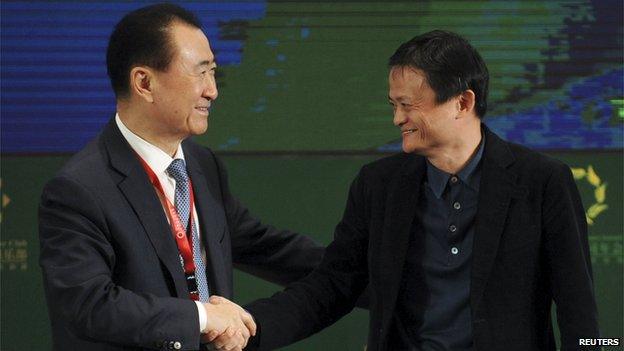
Pictured here with Alibaba chairman Jack Ma, Mr Wang is China and also Asia's richest man
It's a stark indictment of a political system which serves the elite first and the people only a distant second.
It also demonstrates that connections matter far more than hard work and enterprise when it comes to making big money.
This will not make happy reading for President Xi Jinping, especially as his own sister is one of those whose financial relationship with Mr Wang is dissected.
Amidst all the domestic media hoopla about foxhunts and corruption trials, nothing would send a clearer message about leadership resolve to clean up the system than putting one or two close family tigers behind bars.
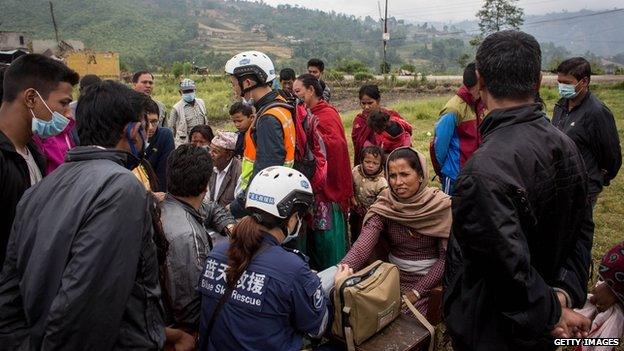
China's specialist medical team has been working in Nepal, treating hundreds of people
Earthquake efforts
China's search and rescue team has been hard at work all week to find earthquake survivors in Nepal.
It's the same team which helped at quakes in Japan, Haiti and Pakistan. But China still doesn't take part in United Nations command structures for disaster relief, preferring to operate under its own military command.
Chinese helicopters rescued their nationals from the site of a huge dam project, one of several that Chinese companies are building, and a reminder of China's infrastructure push in the country.
When Nepal refused a Taiwanese government offer of help this week, some saw China's hand at work or a Nepalese fear of offending China.
Kathmandu had said the distance was too great from Taiwan, but since Taiwanese first responders had played a part in Haiti, it seemed unlikely that distance was the real reason.
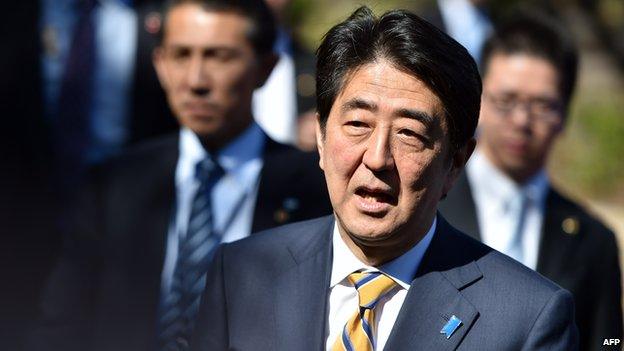
In Washington this week: Japan's Shinzo Abe has raised more concerns about China
And in Washington
The Japanese Prime Minister Shinzo Abe has been in Washington and according to the White House transcript, China was raised 23 times in his news conference with President Obama.
Mr Abe's objective was clearly to remind Americans of the economic and strategic importance of Japan in an Asia dominated by a rising China.
Chinese media accused host and guest of "shallow tricks", specifically of using the South China Sea dispute "as a pretext for cementing an anachronistic security arrangement".
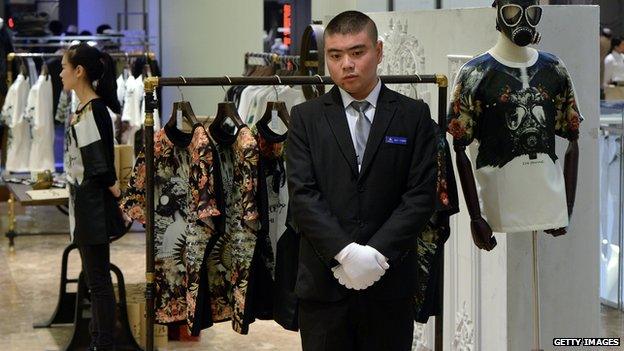
Will China be able to escape the middle income nightmare?
A number of interesting economic stories this week.
The finance minister Lou Jiwei raised eyebrows in some quarters when he said China had only a 50:50 chance of escaping the middle income trap, the nightmare of a previously fast-growing economy which then falls back into stagnation, never graduating to high income status.
Mr Lou is normally more bullish on China's economic prospects.
Which recalcitrant constituency is he trying to scare and which is the reform they are resisting?
Meanwhile the well-connected and vocal editor-in-chief of Caixin Media, Hu Shuli, used her column to warn against the risks of pushing a "mad bull" stock market to try to solve the fundamental issues in China's economy.
Which sounds like common sense to me.
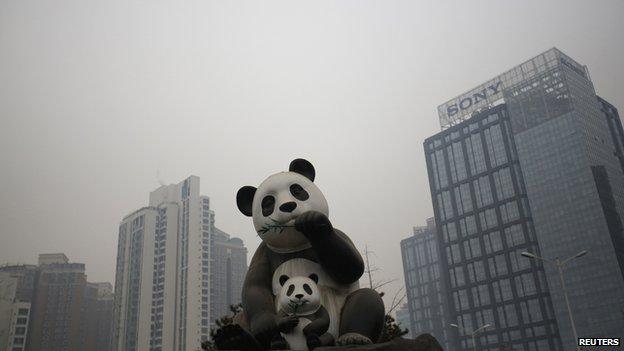
Could environmental risk assessments benefit China?
Will environmental risk assessment start to mean what it says in China?
This week we learned that 63 agencies that carry out this crucial work have been punished after an investigation revealed that relatives and friends of officials at the Ministry of Environmental Protection had "intervened" in reviews or profited by running such agencies directly.
If environmental risk assessment could start getting done in a fair and transparent fashion, with necessary protections put in place around projects which get the go ahead, this would be huge, helping to alleviate environmental blight and to remove one source of public rage and mass protest.
Let's hope.
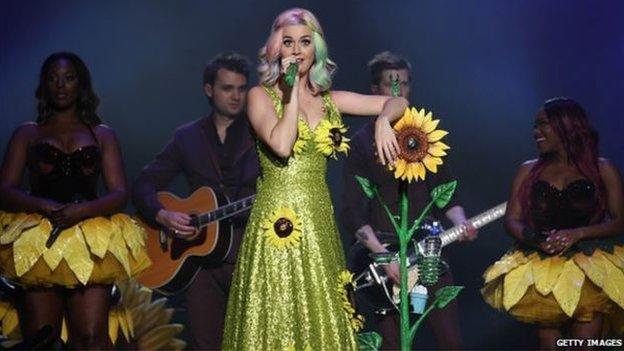
Flamboyant singer Katy Perry caused a stir with her stage outfits in Taiwan last month
'Fruit sister'
And coming back to Taiwan, Chinese Katy Perry fans are in a flap this week after a concert on the island, in which she wore a golden dressed studded with sunflowers and draped herself in a Taiwanese flag.
The sunflower was the emblem of last year's Taiwan student protest but it has also been a personal favourite with Katy Perry for a couple of years so Beijing may forgive her dress.
The flag is another matter.
Mainland fans call the flamboyant star "Fruit Sister" in tribute to some of her previous spectacular stage costumes.
And it would certainly be safer for her to stick to fruit if she wants to be allowed back to the mainland.
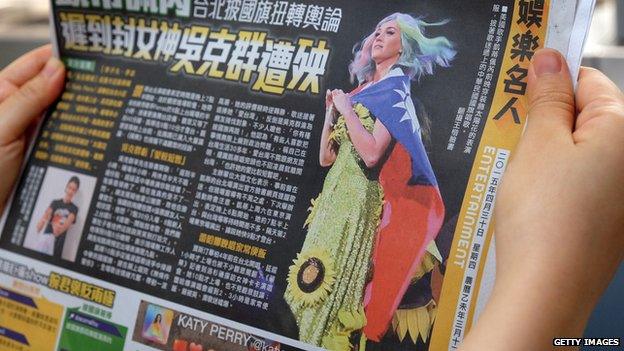
Perhaps it would be safer for Katy Perry next time to stick to candy and fruit costumes?